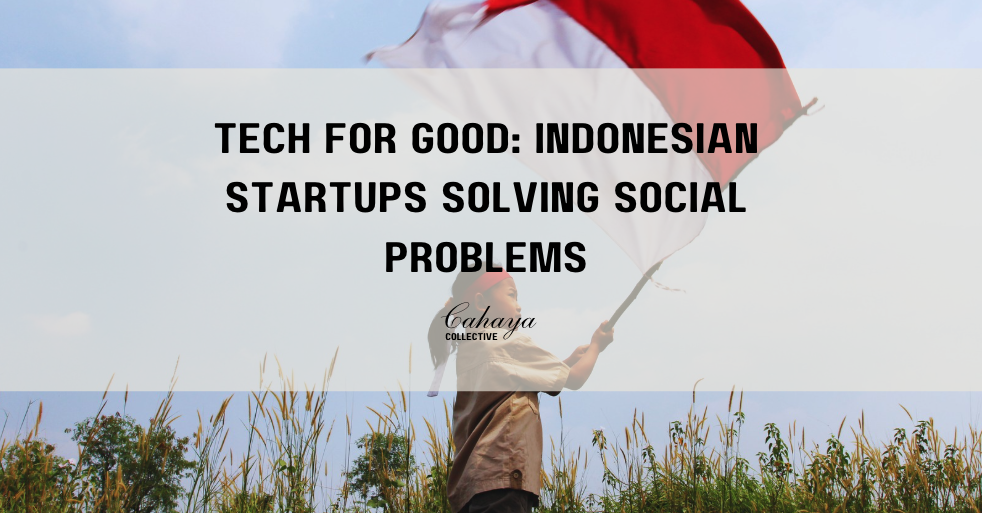
Tech for Good: Indonesian Startups Solving Social Problems
In recent years, the intersection of technology and social impact has been rapidly growing in Indonesia, with a wave of startups emerging to tackle some of the nation’s most pressing issues. “Tech for Good” refers to using technology to address social, environmental, and economic challenges. For Indonesia, a country of over 270 million people, tech innovations are bridging gaps in critical sectors like healthcare, education, poverty alleviation, and sustainable agriculture.
These startups are not only solving immediate problems but also creating long-term solutions for sustainable development. In this post, we explore several Indonesian startups that are harnessing technology to create tangible social change.
1. Halodoc: Revolutionising Healthcare Access
One of Indonesia’s biggest challenges is providing affordable and accessible healthcare to its vast population, especially in rural areas. Halodoc, a health-tech platform, is bridging the gap by offering telemedicine services that allow users to consult with doctors via video calls, chat, or voice messages. This service not only provides convenience but also alleviates the burden on traditional healthcare infrastructure.
For instance, during the COVID-19 pandemic, Halodoc became crucial for maintaining healthcare access without the need for physical appointments. The platform also provides medication delivery services, ensuring that patients can receive prescriptions even in remote areas. By using technology to connect patients and healthcare professionals, Halodoc is playing a key role in improving healthcare access across Indonesia.
2. Ruangguru: Making Quality Education Accessible
Education is another area where tech is making significant strides. Ruangguru, an ed-tech startup, is tackling Indonesia's educational inequality by providing affordable and accessible learning resources. The platform offers online tutoring, video lessons, and interactive quizzes for students of all ages, from primary school to university level.
Ruangguru’s services have been a lifeline during the pandemic, when schools closed and students needed alternative ways to continue their studies. One example of Ruangguru’s impact is its collaboration with the government to provide online learning platforms to millions of students in remote areas, helping to ensure that education remains accessible, regardless of location.
By democratizing education, Ruangguru is empowering a new generation of Indonesians and preparing them to thrive in an increasingly digital world.
3. Gojek: Empowering Communities and Reducing Poverty
Gojek, the ride-hailing giant, is perhaps one of Indonesia’s most well-known success stories. However, the company’s impact extends far beyond providing transportation. Gojek has evolved into a super app offering a wide range of services, including food delivery, e-payments, and even courier services. But at its core, Gojek is driven by a mission to improve the livelihoods of its driver partners, many of whom come from lower-income backgrounds.
Through Gojek, drivers have the opportunity to earn a living and achieve financial independence, often working on their own schedules. The platform also offers incentives, training programs, and access to financial services like micro-loans, further supporting its partners’ economic mobility. In addition, Gojek’s social initiatives have contributed to the improvement of local communities, such as providing emergency services and supporting local businesses.
Gojek’s success demonstrates how a tech platform can create employment opportunities, reduce poverty, and foster social inclusion, all while driving economic growth.
4. Kitabisa: Crowdfunding for Social Impact
Kitabisa is Indonesia’s largest crowdfunding platform, enabling individuals to raise funds for social causes ranging from healthcare and education to disaster relief. Through its platform, people can create campaigns to support those in need, whether it's for medical bills, building schools, or aiding victims of natural disasters.
What sets Kitabisa apart is its focus on social causes and its ability to connect people who are willing to help with those who need it most. The platform has seen widespread success, especially in times of crisis. For example, during the 2018 earthquake in Lombok, Kitabisa helped raise millions of dollars in donations to support survivors and rebuild affected areas.
By leveraging the power of digital technology, Kitabisa is creating a more compassionate society where individuals can directly contribute to solving social problems in their communities.
5. TaniHub: Empowering Farmers and Tackling Food Security
Agriculture is a key sector in Indonesia, but smallholder farmers often face challenges such as limited access to markets, capital, and technology. TaniHub is addressing these issues by using technology to create a more efficient agricultural supply chain. The platform connects farmers with buyers, including restaurants, supermarkets, and wholesalers, helping farmers get better prices for their produce.
TaniHub also offers services like financial support and education on farming techniques, which help improve the productivity and income of farmers. By strengthening Indonesia’s agricultural sector, TaniHub is not only addressing food security but also lifting people out of poverty.
6. Qlue: Enhancing Urban Livability Through Smart Technology
As Indonesia’s cities grow rapidly, urban issues such as traffic congestion, pollution, and inefficient public services have become pressing concerns. Qlue, a smart city startup, uses data and technology to improve urban management and enhance the quality of life for residents.
Qlue’s platform gathers real-time data from citizens, allowing local governments to identify and address issues such as potholes, waste management, and public safety more effectively. The platform also provides citizens with a direct channel to report problems, ensuring that their voices are heard in the development of their communities.
By using technology to improve the urban environment, Qlue is helping to create smarter, more sustainable cities in Indonesia.
7. Socialgiver: A Socially Responsible E-commerce Platform
Socialgiver is an innovative e-commerce platform that allows users to shop for products while supporting social causes. For every purchase made, a portion of the proceeds goes to a social project of the buyer’s choice, such as supporting education, clean water initiatives, or environmental protection.
By integrating social good into the shopping experience, Socialgiver is encouraging consumers to make ethical purchasing decisions. The platform’s approach to business is a win-win: it supports social impact while providing consumers with a simple way to contribute to causes they care about.
Conclusion: A Tech-Driven Future for Social Good
Indonesia’s startup ecosystem is brimming with innovative companies that are not only driving economic growth but also addressing critical social issues. These startups are demonstrating that technology can be a powerful tool for solving problems like poverty, access to education, healthcare, and social inclusion.
As Indonesia continues to embrace the digital revolution, we can expect even more startups to emerge with solutions that improve lives, create opportunities, and make a meaningful impact on society. By supporting these tech-driven initiatives, we are helping to build a brighter, more equitable future for all Indonesians.


